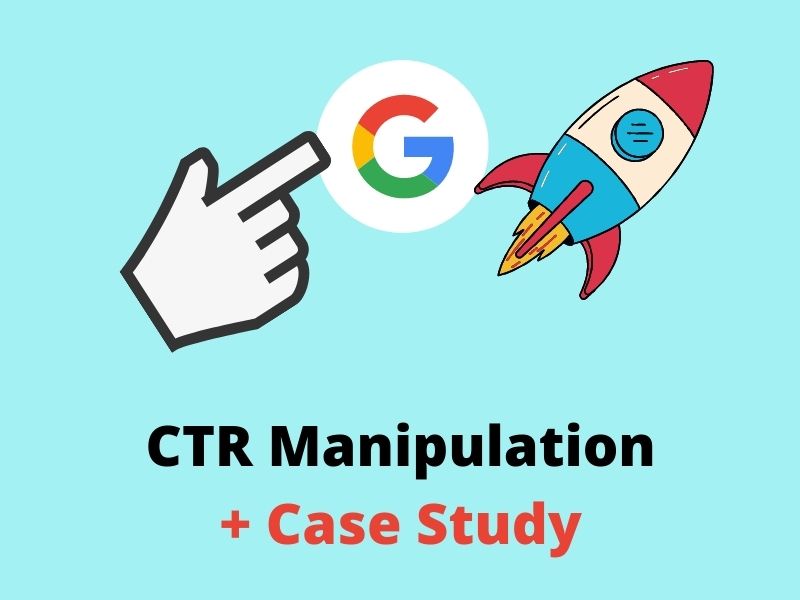CTR Manipulation Strategies: Proven Techniques for Higher Involvement
CTR Manipulation Strategies: Proven Techniques for Higher Involvement
Blog Article
Exploring the Connection In Between CTR Control Services and Individual Actions
In the realm of electronic advertising and marketing, the influence of click-through price (CTR) adjustment services on individual actions stays a complex and appealing topic. By exploring the intricate relationship between CTR manipulation services and user behavior, fascinating insights emerge that might improve our understanding of electronic advertising and marketing techniques and their effects on consumers.
Influence of CTR Control on Behavior
Assessing the influence of Click-Through Price (CTR) adjustment on user behavior exposes essential understandings right into the dynamics of online engagement. CTR manipulation involves artificially blowing up the variety of click a specific web link or promotion to trick individuals and search engines. This method can result in a distorted assumption of a page's appeal or significance, ultimately influencing user actions.

Moreover, CTR manipulation can skew the information used by formulas to personalize individual experiences. This can cause users being offered content that does not line up with their choices or interests, eventually bring about a decline in customer contentment and engagement. Understanding the effect of CTR adjustment on user habits is essential for keeping transparency and rely on online communications.
User Interaction With Adjusted CTR
Individual engagement with adjusted CTR data usually causes manipulated perceptions of online web content appeal and significance. When users interact with content based upon unnaturally filled with air Click-Through Rates (CTR), they may believe that specific info, products, or services are much more popular or credible than they actually are. This can result in users choosing based on misleading data, resulting in potentially undesirable results.
Involvement metrics like sort, shares, comments, and time invested in a website are typically influenced by CTR control. Individuals may be much more inclined to involve with web content that appears to have higher engagement prices, better bolstering the cycle of manipulated assumptions. Therefore, web content developers and advertisers may prioritize producing content that generates high CTR as opposed to concentrating on creating genuinely valuable and relevant product.

Emotional Results of CTR Manipulation

Furthermore, the mental impacts of CTR control can likewise manifest in reference transformed decision-making processes. Individuals may be more inclined to click material solely based upon its viewed popularity, instead of its actual worth or significance to their needs. This behavior shift can cause a surface interaction with online material, where users might ignore top notch however less prominent offerings in favor of those with unnaturally improved CTRs.
Essentially, the emotional implications of CTR manipulation highlight the relevance of keeping transparency and authenticity in on-line communications to cultivate real individual involvement and count on.
Ethical Considerations in CTR Manipulation
CTR adjustment elevates worries regarding tricking customers, distorting data analytics, and jeopardizing the reliability of on-line material. By synthetically pumping up CTR, individuals may be misguided into clicking on links or ads they would not have actually picked or else, leading to a disingenuous online experience.
Another ethical facet to ponder is the fairness of manipulating CTR to acquire an unfair benefit over rivals. Participating in such practices not just violates principles of reasonable play yet additionally threatens the depend on that users place in online imp source platforms. It is crucial for businesses and digital marketers to promote moral requirements in their practices to make certain openness, reliability, and long-lasting sustainability in the online setting.
Ramifications for Digital Marketing
With the enhancing dependence on electronic platforms for marketing objectives, the technique of adjusting click-through prices (CTR) presents considerable ramifications for the effectiveness and integrity of electronic marketing strategies. CTR control can cause skewed information analytics, misdirecting online marketers right into thinking that their campaigns are performing far better than they in fact are. This can result in misallocation of resources, with firms spending in underperforming methods based on falsified CTRs. Furthermore, when users recognize that CTRs have actually been adjusted, it can erode rely on the brand, causing lasting unfavorable repercussions for client commitment and brand name credibility.
Additionally, the use of CTR manipulation services can create an unfair affordable landscape, where firms that take part in such techniques gain a synthetic advantage over those that stick to ethical marketing requirements. This can suppress development and creative thinking in electronic advertising, as success comes to be even more about control methods than providing real value to consumers. Eventually, the implications of CTR control for electronic advertising extend past temporary gains, affecting the general sustainability and reputation of advertising and marketing initiatives in the digital realm.
Verdict
In conclusion, the partnership in between CTR control services and user behavior is complex and multifaceted. The influence of CTR control on actions, customer interaction with controlled CTR, mental results, moral factors to consider, and effects for electronic advertising all contribute fit this relationship. Recognizing these characteristics is crucial for online marketers and researchers alike in order to browse the moral ramifications and make the most of the effectiveness of their digital advertising techniques.
Report this page